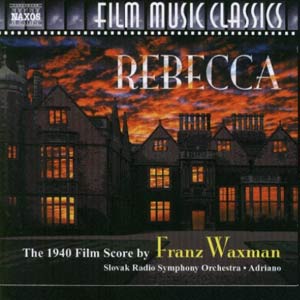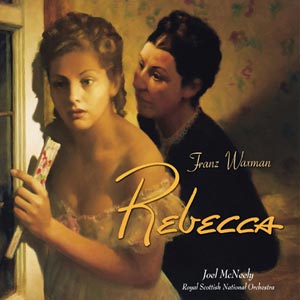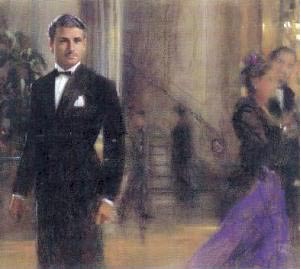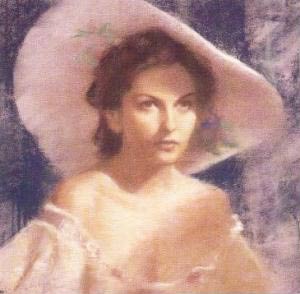Comparative Reviews: Rebecca
[Review #1]: Naxos
[Review #2]: Varèse Sarabande
Music composed by Franz Waxman
Information:
[Review #1]: 1990 re-recording, Adriano conducting the Czecho-Slovak Radio Symphony Orchestra
[Review #2]: Joel McNeely conducting the Royal Scottish National Orchestra
Available on
[Review #1]: Naxos (8.557549) - (originally Marco Polo 8.223399)
[Review #2]: Varèse Sarabande Records (VSD-6160)
Running Times:
[Review #1]: 72:25
[Review #2]: 54:32
[Review #1]:
Crotchet Amazon US
[Review #2]:
Crotchet Amazon UK Amazon US
Rebecca (Naxos)

See also:
Rebecca (Varèse Sarabande) [Review #2]Rebecca , based on the novel by Daphne Du Maurier was both Alfred Hitchcock's first Hollywood film and producer David O Selznick's follow-up to Gone With the Wind. Staring Lawrence Olivier and Joan Fontaine, it won the Best Picture Oscar for 1940, and gained a nomination for composer Franz Waxman, who always declared it his favourite among his 144 films. Waxman would score three further films for Hitchcock, Suspicion (1941, again staring Joan Fontaine), The Paradine Case (1947) and Rear Window (1954). One of Alfred Hitchcock's most successful films, it barely needs adding that Rebecca is a first class thriller, though it is of a more psychological character than most of his work, the central theme of a dead love haunting the present prefiguring his finest film, Vertigo (1958).
The Czecho-Slovak Radio Symphony Orchestra recording of Franz Waxman's score for Rebecca was made 50 years and a month after the original soundtrack was recorded in 1940. The film runs 132 minutes, of which 124 have music, 72 of which are recorded here. Not all the music in the film was by Franz Waxman, and some of the music that was by the composer came from previous scores. The music by other hands has to be omitted; for instance Rebecca as released featured a short cue 'Beatrice', using music by Max Steiner. Adriano restores Waxman's original, unused cue. Some of the music adapted from previous Waxman scores is recorded, most notably in the key sequence 'Mrs Danvers'. This scene featured music from no less than 6 previous scores, but as reconstructed here, plays as if freshly minted. Unlike most scores from this era, the original parts still existed for the re-recording, so it was only for sequences such as 'Mrs Danvers' that any reconstruction was needed. The music is scored for conventional symphony orchestra, with, besides Waxman's trademark saxophone, one important addition. Waxman had used three ondes martenot, an early electronic instrument in The Bride of Frankenstein (1936), and for Rebecca, just as Miklós Rózsa would introduce the theromin in Hitchcock's Spellbound (1945), Waxman used the novachord, an instrument similar to the Hammond organ, to intimate the supernatural presence of the first Mrs de Winter. The device has been so copied over the years, and later parodied, that today there is the danger of it sounding quaint, or worse, comical, such that the shivering strings that hover around the keyboard add a needed chill.
It should be said that this is unquestionably a great score, but for anyone grumbling that at 72 minutes it is not complete, let me just say that 72 minutes is quite sufficient. Even Mahler rarely lasted much longer! Rebecca is a very rich, complex and lavish score, and over 15 generally quite lengthy tracks, this 1990 extended-condensation does Waxman proud. This is romantic music, music that balances waltzes against shimmering impressionism and uncanny evocations of the world beyond the veil. 'At Dawn' contains a pulsing echo of the famous creation scene from The Bride of Frankenstein, and the final scenes ache with the same yearning desire that make Bernard Herrmann's The Ghost and Mrs Muir and Vertigo so wonderful, all building to a thoroughly thrilling inferno of a finale. The playing is very good, if just lacking that last ounce of sheer Hollywood romanticism. Even so, this is a most accomplished album, with the only real flaw in the sound being, if you turn the volume up far enough, some occasional but quite noticeable electronic line hum.
Franz Waxman himself prepared many concert suites from his film scores. Indeed, his suite from Rebecca was played on American radio as part of the original promotion of the film, and the suite gained considerable popularity over the years. We are not told, but presumably for Sunset Boulevard: The Classic Film Scores of Franz Waxman conductor Charles Gerhardt and producer George Korngold used Waxman's own suite. The Classic Film Scores Series spanned the 70's with a series of first class recordings of suites from the Golden Age of Hollywood, and at a time when few could imagine it might one day be possible to make complete albums of individual classic scores, did a wonderful job of resurrecting lost treasures and introducing a new generation to the glories of orchestral film music. The Waxman edition in the series was recorded, in quadraphonic sound in 1974, and remastered and remixed into Dolby surround sound for CD release in 1989. The Rebecca suite features the cues: 'Prelude', 'After the Ball', 'Mrs Danvers', 'Confession Scene' and 'Manderley in Flames'. The sound is more lushly, decadently romantic than on the Adriano recording, and has a greater, filmic intensity more closely reproducing the sound of classic Hollywood. There also seems to be great dynamic range, and rather more tape hiss. Inevitably the National Philharmonic give the superior performances. It would certainly have been nice to have heard Gerhardt record the complete score, as what we have of his interpretation surpasses the Marco Polo release. That should not stop you buying Adriano's much more complete album and still most commendable album, indeed, it should be considered more or less essential to any good film music collection. Then again, so such Sunset Boulevard: The Classic Film Scores of Franz Waxman, for this disc additionally contains excellent suites from not only the title film, but from, among others Prince Valiant, A Place in the Sun and The Bride of Frankenstein.
Gary Dalkin
Naxos:
5
Rebecca (Varèse Sarabande)

This new recording of Franz Waxman’s own favourite score, out of the 144 he scored in Hollywood, competes with the 8-minute Rebecca suite within ‘Sunset Boulevard – the Classic Film Scores of Franz Waxman’ compilation (RCA Victor GD80708) recorded by Charles Gerhardt and the National Philharmonic Orchestra in 1974, and a 72-minute album devoted to the Rebecca score on Marco Polo 8.223399, recorded in 1990 by Adriano conducting the Czecho-Slovak Radio Symphony Orchestra.
If just a memento of the main themes is required, look no further than the Gerhardt recording. The suite incorporates ‘Prelude’, ‘After the Ball’; ‘Mrs Danvers’; ‘Confession Scene’ and ‘Manderley in Flames’. Although recorded in the 1970s, the sound is stunning (so too were all the other recordings in Gerhardt’s Classic Film Scores series). Gerhardt pulls all the stops out to deliver a brio performance full of attack and darkly shaded romance. He creates a palpably tingling atmosphere of evil and menace and you can just imagine the flames crackling fiercely and unrelentingly through Manderley.
The digital Varèse Sarabande sound is even better, and McNeely scores immediately with a chillingly effective Main Title/Foreword /Opening Scene that creates an ominous brooding atmosphere with swirling string figures and strident brass as the heroine dreams she is returning to a deserted, desolate, ruined Manderley. Adriano is not far behind, but his reading is spoilt by a wayward, wavering trumpet that also mars the opening Selznick International Trademark music.

Both recordings include the charming waltz ‘Hotel Lobby’ for an early meeting between the Laurence Olivier as Max de Winter and the Joan Fontaine character. McNeely’s waltz is light-hearted, dreamy and full of romance, Adriano’s slow and deliberate. Two ‘Tennis Montage’ cues follow in both recordings. Both conductors capture the girl’s shyness, naïveté and vulnerability, her dreaming and yearning for romance. The music reflects her innocence, and the high spirited nature of her romance; its humour and intensity but occasionally shadows intrude, a forewarning of the threat at Manderely. McNeely’s character sketches are sharper, his phrasing more appealing; this is a joyous courtship. Both include the attractive intimate dance music.
Adriano’s recording has some eighteen minutes more music than the new Varèse Sarabande album. Morning Room’ carries the dark foreboding atmosphere forward with the Rebecca theme on the novachord. [The novachord is an electronic keyboard instrument with a sound not unlike a Hammond organ. It was used to create eerie effects in numerous Golden Age scores.] ‘Beatrice’, another track exclusive to Adriano, returns the music to a warmer romantic mood with a tender waltz and humorous, timorous figures and a hint of the Rebecca theme as the girl learns a little more about her predecessor.
The Walk to the Beach/The Boathouse and Return from the Boathouse are on both recordings. The walk is carefree, reminiscent of the earlier courting music but the boathouse has altogether chillier associations; the music clouds significantly adopting an aura of anxiety and evil with Rebecca’s theme brooding mistily. Crushed woodwind cries, as though of an animal in pain, and swirling, screaming strings ratchet up the tension. At last the music calms down as the by-now rattled heroine leaves to a questioning statement of her theme.
There is more additional music on Adriano’s recording: a sparkling cue for harp, lush strings and celeste announce the beauty of the girl’s ‘New Dress’ and the innocence and purity of its wearer. ‘Sketching Room’ is another light-hearted cue - a breezy, then rueful reprise of some earlier courtship material. ‘Manderely Ball’ is a waltz, lilting and passionately romantic. ‘After the ball – The Rockets – At Dawn’ is tense material with Rebecca’s theme sounding even more obsessive, the music ever more eerie and threatening; the novachord implying Rebecca’s malign influence reaching beyond the grave in a persistent crescendo against a tremulous solo violin suggesting the girl’s plight.
Of course some of the foregoing material is heard under different headings in McNeely’s recording. Both CDs include tracks entitled ‘Rebecca’s Room’ and ‘The New Mrs de Winter’. McNeely’s reading is very potent; Waxman’s eerie, lascivious music brilliantly evoking the decadent Rebecca, beautiful, treacherous, corrupt and corrupting - her evil spirit threatening the new Mrs de Winter whose virtue, the music hints, will ultimately triumph. Adriano uses the novachord most effectively to enhance the chill of this ghostly scene with telling dynamics and wide perspectives. Of course Rebecca’s malign influence has also infected Manderley’s sinister housekeeper Mrs Danvers and she is portrayed on both albums. McNeely uses Waxman’s original scoring that was not fully used in the film. Mrs Danvers’ music is very much like that of Rebecca, dead-sounding, ghostly, evilly obsessed; and twisted, suggesting lesbian love; in fact the novachord is used for the possessed Mrs Danvers as well.

‘The Confession Scene’ plays Rebecca’s theme as a straightforward romantic melody until her essentially rotten character (echoed in that of the Mrs Danvers) is revealed at which point the theme becomes twisted and full of malice. McNeely does not put a foot wrong, Adriano is more hesitant, the climax more measured and again the use of the novachord is effective. (McNeely eshews its use in his recording preferring the effects to be created more naturally using conventional instrumentation.)
The music for the climactic scene when Manderley goes up in flames after Mrs Danvers evil machinations to destroy the girl go awry, is most exciting. Adriano’s reading is a little too deliberate with some curious hesitancy. McNeely is much more spontaneous and his music really thrills.
A worthy reading of a masterly, classic score that is wonderfully atmospheric and full of brilliant characterisations. This recording must now be the first choice but if you want a more complete version go for Adriano on Marco Polo; if you want just the main themes go for Gerhardt on RCA.
Ian Lace
Varèse Sarabande:
5
Return to Reviews Index